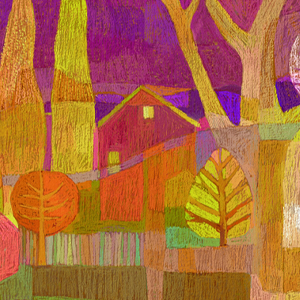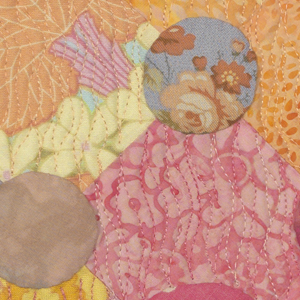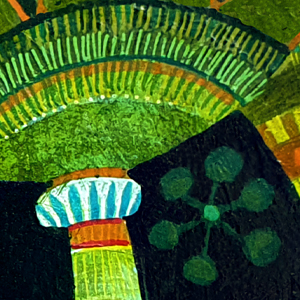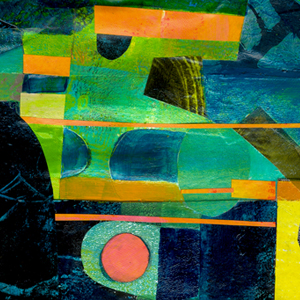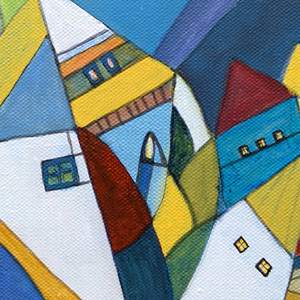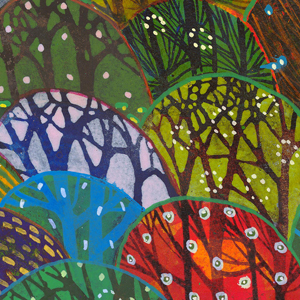
Good Medicine
Know Thy Neighbor
How Community Rehabilitates our Assertions
Lester Liao
Artwork: “Almost Blue” by Nadia Lysakowska © 2024
For the past several decades, our youth have been encouraged to make their voices heard. Those youth have become the adults of our world who bring their assertions to the public square. Yet while we have developed our ability to make our thoughts known, we have subsequently lost the ability to consider the impacts of those very assertions on the people we live with in our society. Our words have become aggressive. While it is inevitable for disagreements to arise in pluralistic societies, how we assert ourselves matters. It is in attending to how our words interact with the real people around us that we can restore the life-giving effects of assertions that are winsome, loving, and wise.
Western societies have long been forming a particular type of citizen. On one hand, the process has been very understandable. There was a democratic, normative mindset that drove our vision of civic education. As a society, we wanted to honor individual opinions. Everybody could and would have a voice at the table. In his essay Democratic Education, C.S. Lewis called this the desire for “fair play.” This was important because it would enable our democratic political system. In Some Thoughts Concerning Education, John Locke warns against children interrupting conversation because it sets the stage for chaotic discourse. He viewed it as an “impertinent folly” to answer a person before hearing his case fully and as extremely disrespectful. We have been careful in how we strive for democratic ideals. From classrooms to roundtable discussions, we were, in theory, fostering the conditions for civility in the public square. The intention was noble.
But there was another side to this process. As speaking out became the norm, we forgot something that ancient thinkers have cherished for centuries. We penalized silence, and in so doing we assumed it lacked merit. Students were not simply docked marks for saying nothing, they were taught through the very pedagogical structure that being silent was less valuable. Speech and participation for its own sake was enough. Thus, we have discouraged contemplative habits. Rather than preparing students to dive gracefully into civic discourse, we told them to get moving.
In developmental pediatrics, I work with many families who struggle to steer their children through the academic and social gauntlet of schooling and public life. My active participation in our encounters requires silence. Rather than immediately asserting my perspective and interrupting (a notorious physician practice), I listen and learn about complicated home dynamics, parental guilt and concerns, and more. I learn things I would have never elicited with my questions. This information is not only necessary to accurately understand the issue, but its sharing builds rapport. The more families see that I am genuinely listening to them, the more they are willing to listen to me. Ideally, both of our understandings of the situation will be enriched and a path forward will be found for the child.
There is genuine value in learning to express one’s opinion. Those who are shy may need simple encouragement. But, we seem to have gone too far. Self-assertion has become a virtue in its own right, regardless of the content. It is the public square outgrowth of the individual ideal of authenticity that Charles Taylor has elucidated in Sources of the Self. One opinion is always as good as another. The result has been an epistemological disaster, and Tom Nichols has highlighted the crippling effects on expertise in The Death of Expertise. The efficacy of vaccines becomes a matter of preference. The individual experience is upheld as the arbiter of truth, and the possibility of self-deception is never considered. Holding our tongue is seen as a weakness rather than an essential step of critical thought. Our postmodern suspicious disposition is aimed at others and institutions, but hardly ever at ourselves.
The greatest consequences of this approach have been on community. First, we have a hard time hearing when cacophony reigns. We no longer know who to trust. Our angry words can leave a path of destruction because we assert and attack before we understand. An author’s reputation is ruined over misquoted words. Jobs are lost. Even if the accusations are later corrected, the damage is already done. When we assert ourselves religiously, we fail to enter the Other’s experience. We fail to see another person at the end of our assertions.
In destroying trust, self-assertion also elevates the individual over the community in unhealthy ways. We grow accustomed to a world on our terms, focusing on our personal needs as opposed to what might benefit our neighbors. The language of rights immediately postures us to notice violations and to focus on the things to which I am entitled. We think of infringements rather than the uses of rights, the negatives rather than the positives. While rights are a good thing, combined with self-assertion, a shallow view of self-esteem, and a culture of fraying trust, they too go askew and contribute to a culture where bridges are increasingly difficult to build and sustain. Simone Weil preferred to think in terms of obligations we have to one another by nature of being eternal creatures. But we are individuals today. Rather than deep communities, we form what the late sociologist Robert Bellah called “lifestyle enclaves.” We no longer gather in mutual dependence but simply to be around people who share our interests from yoga to sipping tea.
This damage to our communities is not only a consequence. It is likely a cause. In Bowling Alone, the political scientist Robert Putnam noted the many ways in which our contemporary culture impoverished social capital, ranging from generational mindsets to technology and the rise of the suburb. He did this two decades ago before social media took the world by storm. Many things have weakened communities. But the forms of self-assertion we confront today could only grow to such cancerous proportions in relationally impoverished environments. Without strong relationships, we must look to ourselves for worth. I am not referring to casting off traditional societal structures that confined people to their social roles. One can reject an oppressive structure and still have basic, healthy attachments. We lack the warm approval of a familial embrace or even the respectful dissent of a friend who reminds us she has taken our words seriously. Approval is a necessary human good, but with nowhere to find it we must turn within.
We have a name for approval when its object is the same as the subject: self-justification. Here the theological eye can help us to see what is at stake. We need to know that we have value, that in some cosmic sense we stand declared right and even vindicated. This impulse is itself not a bad thing, for it reminds us that we are aware of our inadequacy. The Christian faith answers this precisely. God reminds us that the need is real, but that we cannot fulfill it ourselves. Our justification is given to us from on high as an act of pure grace. But our society at large does not accept this gift. If we do not find justification in him, we will look elsewhere. While many societies have tried to vindicate self-worth through one’s duty and role in a social group, we mostly reject communitarian approaches in the West. And if we spurn our neighbors, we are left with ourselves. And all the weight of the approval of God will fall on our tiny shoulders. No wonder we speak so loudly.
A warmer form of discourse and all the relational richness it entails is something our culture craves. This is in part what makes the Church a light in our world. We are to be known for the ways we love and support one another. Of course, in reality, churches are not perfect places. Orthodox Christians often refer to the Church as a hospital for the sick. As someone who spends most of his days in hospitals, I think the metaphor is apt. Patients’ realization of their own weakness is precisely why they are there. Both church leaders and members walk with the most integrity when they remember this truth and live out of it. The church cannot excuse evils within (or without) its walls, but nor can modern-day cynicism drive exacting evaluations of it.
In the spring of 2022, I was rattled watching the news about the uptick in anti-Asian hate crimes south of the border in the United States. With such a healthy percentage of Asian members in the congregation like myself, I expected there to be tension and anger at the first Sunday service after news of the attacks broke. To an extent, there was that. But what surprised me was the very first thing that we were met with that Sunday: A prayer of repentance and reconciliation. We prayed for safety and justice in Asian communities. We asked for forgiveness for ways in which we haven’t acted with truth and integrity. We also prayed for forgiveness for the ways in which we feed the fires of contempt through words and reactions. The point being, even in our political disagreements and racial differences, my church tried (imperfectly) to be united. Our words were anchored in a community of prayer, not first and foremost in self-assertions. Yet it was precisely this anchoring that then allowed those words to still come. Injustices could be decried without fracturing the community because we recognized our shared posture as fallible before God.
Even if our culture rejects God and Church, we would still benefit from moving toward a more communal notion of approval over our siloed individualism. Communities remind us that we are insufficient and that we must be open to a personality outside ourselves to shape who we are. In many ways, we see this most clearly in children. Many of the kids I see struggle with integrating socially because they are so preoccupied with their own perspectives that they alienate their peers. I think of Eloise, a preteen girl, who only truly began to realize that she needed to be less adamant in her point of view after being surrounded by peers who outright told her she was being rude. Many children have no choice but to be refined by social interactions. They interact with real peers and have not yet been fully launched into cyber networks where words elicit less relational feedback. In fact, being part of a regular school community is one of the best recommendations that I give for children who are having social and relational difficulties.
When lives become interwoven, our rougher edges are smoothed by healthy friction. But this can only happen when our relationships take priority over our assertions. Eloise cared for her friends, and this in turn helped her to see the danger of her unrefined assertions. The love of the person before us must be more important than the desire to justify ourselves. Ironically, in beginning to free ourselves from the oppressive need to constantly declare our worth, we will begin to see that our relational nature thrives on being in community. If we always put ourselves first, we will lose those cherished friendships that build who we really are.
We have trained a generation to assert indiscriminately, but this need not be the end. In communities, we will necessarily learn to check our egos. We see that our words affect real people, not Twitter trolls. Fail to learn this, and we will see that there is nobody around to hear us at all. Knowing our neighbors makes us reconsider. A relational context will rehabilitate many of our self-assertion ills, and it will prepare us for wisdom.
My wife and I recently sat with a group of friends discussing everything from Scripture, to the housing market, adult relationships with parents, to the results of the U.S. presidential election. Strong opinions were put forth on the latter topic in particular, and there were definitely disagreements. What tempered the words, and barred a superficial estimation of the “opposing party,” was the fact that this was a community. We know each others’ children and eat in each others’ homes. This context shapes the things we declare because we no longer speak into a void. Tangible lives will be affected, and this makes us pause. The monologues can still come. But when they do, they will be as salt on a poached egg. They will deepen the discussion, drawing attention to its flavors and textures. And we will all be better fed for it.
 Lester Liao, MD MTS FRCPC, is a Developmental Pediatrician and Assistant Professor of Pediatrics at the Montreal Children’s Hospital and McGill University. He has a special interest in culture, the medical humanities, education, and the anthropology of childhood. His interests have taken him into work as a vocation consultant and Fellowship Director for the Commons Fellowship on theology, work, and culture. He currently directs the Doctor as Person Fellowship Program and is Course Director for The Formation of the Professional as Healer.
Lester Liao, MD MTS FRCPC, is a Developmental Pediatrician and Assistant Professor of Pediatrics at the Montreal Children’s Hospital and McGill University. He has a special interest in culture, the medical humanities, education, and the anthropology of childhood. His interests have taken him into work as a vocation consultant and Fellowship Director for the Commons Fellowship on theology, work, and culture. He currently directs the Doctor as Person Fellowship Program and is Course Director for The Formation of the Professional as Healer.
Spring 2025
Part I: Defining Virtue
James Arthur
Dayna L. Cunningham
Greg Lukianoff
Najeeba Syeed
Interlude: Defining Moments
Part II: Defining Vocation
MORE







